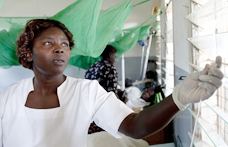
Mind over Matter
 Can we condition health workers to believe that they should work in underserved areas? Among the nonmonetary incentives used for retaining workers in rural areas, intrinsic motivation—or inherent willingness—can be a significant influence. The problem with intrinsic motivation is that by definition, it’s intrinsic, and cannot be cultivated or systematically introduced into a cohort of health workers. Or can it?
Can we condition health workers to believe that they should work in underserved areas? Among the nonmonetary incentives used for retaining workers in rural areas, intrinsic motivation—or inherent willingness—can be a significant influence. The problem with intrinsic motivation is that by definition, it’s intrinsic, and cannot be cultivated or systematically introduced into a cohort of health workers. Or can it?
Cognitive dissonance
A classic study by psychologists Leon Festinger and James Carlsmith (1959) on cognitive dissonance—the phenomenon by which a person states an opinion different from what he or she believes to be true—may hold the answer.
Simply put, three cohorts performed a mundane task, arranging and rearranging plastic spools, for over an hour. The first cohort was the control group, and the experiment for them ended here. The other two cohorts were asked to speak glowingly about the spool-shifting task to another potential subject, for which one cohort was paid $1 and the other $20.
At the experiment’s conclusion, the researchers assessed the real attitudes of the different cohorts. Most members of the control group called the task what it was—extremely boring. The group paid $20 did the same. The interesting change happened with the $1 group, who professed that the task of shifting spools around in a box for an hour was indeed a wonderful activity.
The $1 group
When praising the mundane activity to other subjects, the group paid $1 was stating an opinion different from their genuinely-held opinion. However, rather than stating an untruth for a measly dollar, they modified their opinions to agree with their statements—now a truth. The $20 group found the monetary inducement strong enough justification for them to tell an outright lie, and their privately-held opinions remained unchanged. The control group, of course, was not asked to lie at all, and so expressed their genuine opinion in the assessment. How will this help keep doctors in rural areas?
How will this help keep doctors in rural areas?
Like the study participants, in order to change a person’s opinion, we should induce him or her to state the opinion, but the inducement used should be just above their threshold. If the inducement is too strong, the person’s opinion will not change.
If the pattern of this experiment can be replicated in health worker cohorts, one could propose an education system where medical and nursing students are induced to espouse messages that favor working in underserved areas—for example, an award plaque for an essay competition on working in underserved areas.
Another strategy could involve bringing rural medical officers to speak to current students and encourage them to pursue rural service as well. The twist is that the targets here are the medical officers rather than the students. In choosing to travel to the capital, the medical officers’ unstated motivation is the per diem and day off work, yet in conveying the message to the students, they return to their jobs believing the message more strongly.
Believing in the arguments
On a personal level, I cannot remember participating in a single competitive debate where I did not believe in the side that I was arguing for. Looking back, I find that rather than making arguments I believed, I believed in the arguments that I made. This is the power of psychological manipulation.
The health workforce field has seen a surfeit of health economists who predict human behavior as a function of incentives. It may be time to stock ourselves with “health psychologists” who predict human behavior as a function of being human.
Related items:
Photo 1 by Jennifer Solomon. Photo 2 by Trevor Snapp (Nurse at Lugari District Hospital, Kenya)


